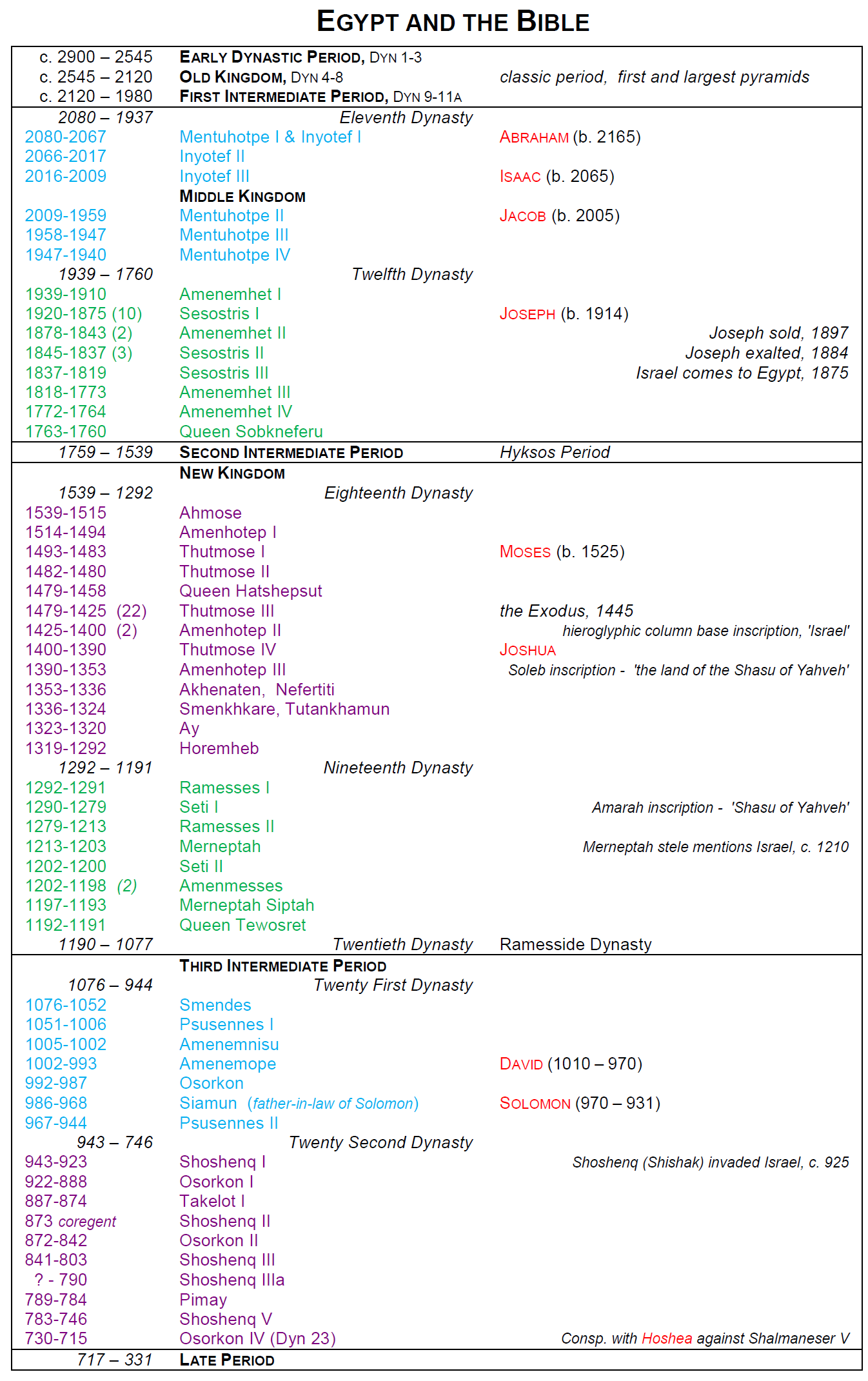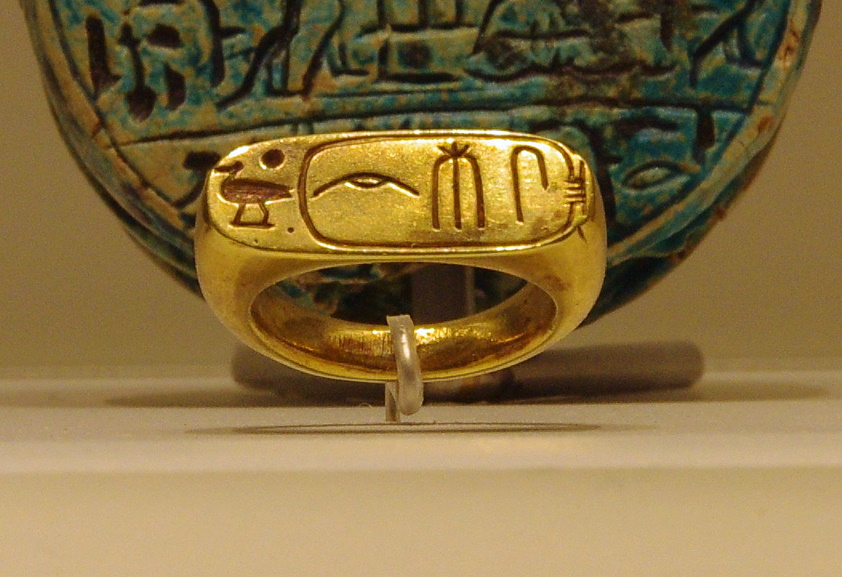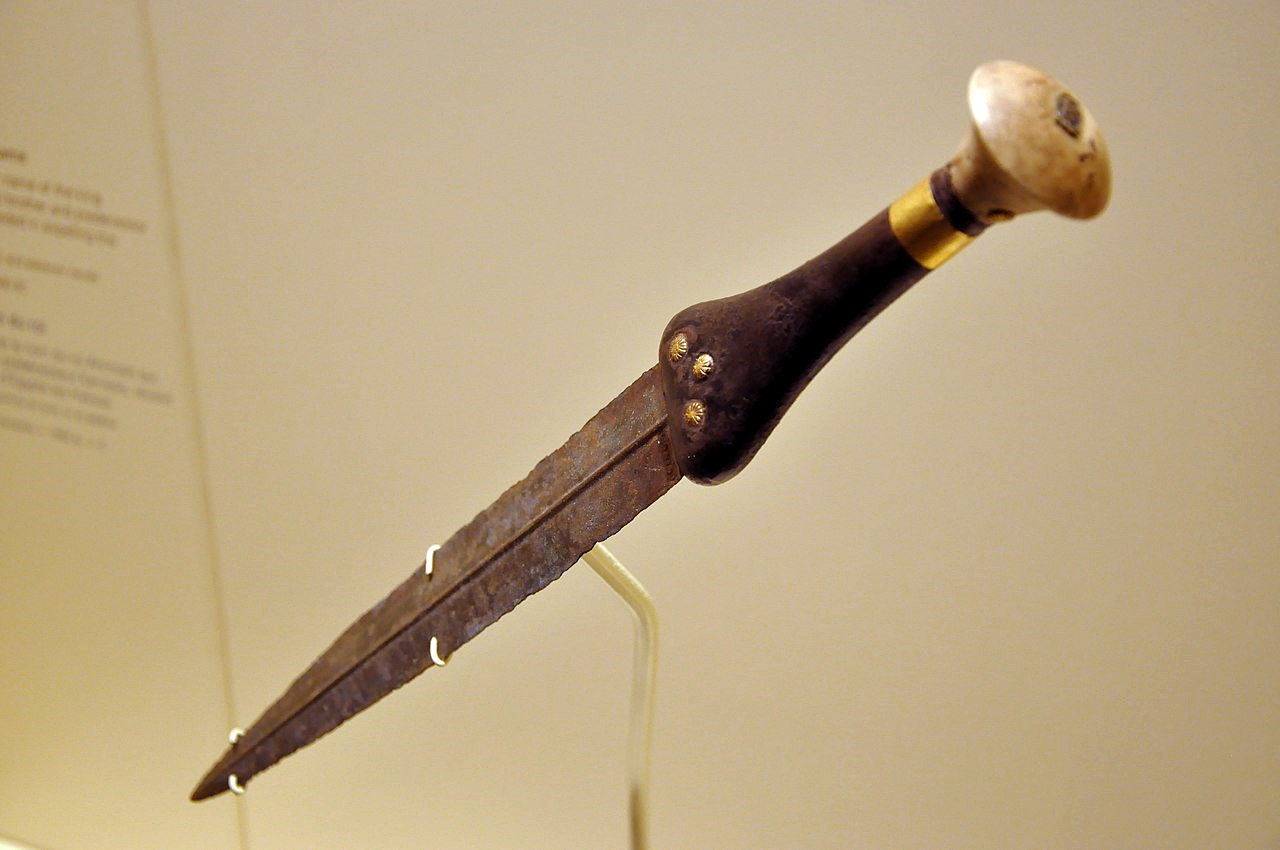Exodus 1:8 says, “Now a new king arose over Egypt, who did not know Joseph.” Who was that king? The quick answer is that his name was Ahmose. If you’re curious how we know that, keep reading.
The first five books of the Bible refer many times to the kings of Egypt, but never by name. They either refer to him as “king” or as “pharaoh.” In fact, no king of Egypt is named in the Hebrew Bible until Shishak (Shoshenq), who attacked Israel a few years after the death of Solomon (1 Kgs 14:25; cf. Acts 7:18). Incidentally, “pharaoh” just means “Great House” in Egyptian, a polite way of referring to the king without using his other titles or names.
The identification of the “king who knew not Joseph” can be deduced from even a general overview of Egyptian history and a knowledge of when the Israelites were there. Joseph had come to Egypt as a slave in the early part of the 12th Dynasty, during a period of Egyptian strength known as the Middle Kingdom. His family came down to join him in 1875 BC, perhaps during the reign of Amenemhet II. I say “perhaps” because there is still a degree of uncertainty about the dates of the Egyptian kings of this time, with estimates varying by up to 50 years one way or the other. At any rate, the 12th Dynasty slowly weakened, and eventually people filtering in from Canaan in the north, referred to by the Egyptians as “Hyksos,” came to power. Egyptologists refer to this as the Second Intermediate Period, mainly because it was a time of upheaval, weakness, and division. Incidentally, the Hyksos kings were probably favorable toward the growing Israelite clan. They came from the same region. The Second Intermediate Period lasted for about 220 years, from 1760-1540 BC.
The Hyksos were eventually kicked out by native Egyptians. The Egyptians were initially led by a man named Khamose, but he was killed in battle, and his brother Ahmose took over and succeeded defeating and removing the Hyksos. Ahmose became the first king of the newly minted 18th Dynasty, which also ushered in a new period of Egyptian strength known as the New Kingdom (1540-1080; see chart below). This was the king who did not know of Joseph. In fact, he was (justifiably) concerned about having any Asiatics (either Canaanites or Israelites) in his land, which led to his enslavement of them and his attempt to reduce their numbers by killing all the baby boys. Ahmose came to the throne around 1540 BC, and Moses was born a few years later, in 1525 BC, during the middle of the reign of Ahmose (see Ex 2:1-10).

Chronological chart of select Egyptian periods and the Bible.
Some interesting relics from the personal possessions of Ahmose have been found. They can be identified as once having belonged to him because they are marked with his name. One is this gold finger ring.

Gold signet ring of Ahmose; photo by AD Riddle.
Another is a ceremonial dagger, made with a bronze blade, an ivory pommel, an ebony handle, and with decorations of gold. The cover photo for this blog post shows a closer view of the pommel, with it’s cartouche bearing the name of Ahmose.

Dagger bearing the name of the Egyptian king Ahmose.
The mummy of Ahmose is thought to have been discovered as part of the Deir el-Bahri Cache in 1881, although some have questioned this identity. The mummy is on display at the Luxor Museum.

Mummy of Ahmose, at the Luxor Museum.



Cool stuff, Didn’t the Hyksos from Canaan live in the promised land before Israel was in that region?
Yes, that seems to be the case. The name “Hyksos” is Egyptian, and simply means “foreign king.” Material remains from recent excavations, especially those at the Hyksos capital of Tel el-Dhaba in the Delta, indicate pretty strongly that they were what we would call Canaanites. Its not certain how early the term Hyksos was used by the Egyptians, but they interacted with Canaanites from a very early period, even before Abraham. So yes, their ancestors lived in Canaan before Israel was a nation. By the way, the term doesn’t appear in the Bible; but then, the Bible doesn’t describe much of anything during the 400 years from Joseph to Moses, and the foreign kings that we refer to as Hyksos appeared and disappeared from Egypt during that time.
Interesting. I’ve always understood the king to be Salitis, the first Hyksos king….How does this explain the turn on the Israelites – Joseph was powerful and saved Egypt – had favor of Pharaoh – it seems odd that Egypt would turn and begin to annihilate them (but, stranger things have happened).
If it had been the Hyksos who enslaved the Israelites (which would be odd, given that they were fellow Semites), one would have expected them to be liberated when the Hyksos were kicked out. Also, it would be odd for the Hyksos to be concerned about the Israelites turning on them in battle, both because they were fellow Semites and because the Israelites would not have been very numerous at the start of the Hyksos period, at least in comparison with the end of it. Also, the new king is concerned that the Israelites might “depart from the land” (Ex 1:10), which does not sound like something a foreign ruler would say. It is probably true that the Hyksos rulers were not familiar with Joseph either (like Ahmose and the subsequent kings of the 18th Dynasty), but they wouldn’t have had the other concerns (Israelites turning on them in war; Israelites leaving the land). I think the explanation for why Ahmose turned on the Israelites is the amount of time that had elapsed. The memory of Joseph’s work to help Egypt had been lost during the Second Intermediate Period; his view (correctly) was that the Israelites were non-Egyptians, akin to the Hyksos, and he feared they were a threat. The Hyksos would have been much more likely to enslave native Egyptians than fellow foreigners. Also, the flavor of the text seems to be that Moses was born not long after the initial edicts regarding slavery and killing the male offspring of the Israelites.
You had said it that the Israel favoured the foreign king, Hyksos against the Egyptians. That means the Egyptians had become second class citizens in their own land, hence the need for revolt. Egypt wouldn’t have enslave Israel if Israel had not expressed dominant behaviors over them
I won’t pretend that I understand all of this, but it’s still fascinating to me. Thank you for posting!
Fascinating stuff altogether. I find it amazing that today we can actually see the remains of “the king who knew not Joseph”and artifacts of the people of the Bible through archaeology. There are more evidences for proving the Bible today through science and archaeology than ever before and people are still in love with their sin. To quote John Lennox (uncle of Kristen Getty)”atheism is a fairytale for people who are afraid of the light” ?? Thanks for the article. Stephen Meharg here in Ireland. ?
So revealing, thank you sir.If i may ask how many kings reigned and how many years gap between Joseph and the king that didn’t know Joseph?. I hope questions are entertained here, i want to be sure I’m not breaking any community rules.
Thanks for the question, Ken. If this identification is correct, the length of time from the arrival of Joseph’s extended family in Egypt (Gen 47) in 1875 BC and the coronation of Ahmose in 1539 is about 334 years. The number of kings in that period is difficult to estimate because of the political turmoil in Egypt itself. The earlier kings (12th and 13th Dynasties) are fairly well documented, as are those of the new dynasty started by Ahmose (18th Dynasty). However, the intervening period was one of turmoil, and even more than one dynasty going at once. This included the Hyksos, who were non-Egyptians (15th Dynasty), and thus careful records of their rulers were not kept by the Egyptians. And, they ruled in the Delta region at the same time that Dynasties 16 and 17 ruled further up the Nile. So the number of kings is really difficult to estimate–several dozen that we know of.
Hello sir I would like to ask, the Bible says that the Israelites lived in Egypt for 430 years, Joseph became a governor at the age of 30 and died at 110 so 110-30 makes it 80 years of Joseph’s reign in Egypt.
430-80 of Joseph’s reign is 350, in one of your replies you said a new king came into power who didn’t know about Joseph after 334 King is Ahmose who didn’t know about Joseph, so in my calculations 350-334 is 16 years of Hebrews Slavery in Egypt.
Is my analysis true?
Hi, Jonathan. Thank you for your question and allowing me to clarify. The 334 years I mentioned is not from the death of Joseph, but from the beginning of the sojourn (when Jacob and the clan entered Egypt, relatively early in Joseph’s life: 1875 BC). The correct calculation would be to subtract the 334 years (+/-) from 430. As you can see, that would mean that the enslavement of the Hebrews lasted for about a century.
I just want to say thank you for this historical information.
I have always be curious about the Pharaoh that didn’t know Joseph and where he came from. Thank you for all the information and answers to other people. Very interesting. Thank you.
Thanks for this, I really appreciate this.
However, I have a question? Is it safe to say that Joseph and what he did to save the Egyptians was not documented by the Egyptians because Joseph was a foreigner. That we only know about Joseph because of the Hebrew documentation?
That’s a great question. I don’t believe that Joseph’s status as a foreigner is a likely explanation for why he doesn’t appear in Egyptian records. After all, he was favored by Pharaoh and appointed to rule over all the land. They must not have been too embarrassed by him! As a parallel, the Egyptians regularly employed foreigners as mercenaries in their army, and they did not try to cover up that fact in their records. Even their art shows such foreign mercenaries in a favorable light. I think the more likely reason we don’t find Joseph’s actions in Egyptian records is simply because our records from that period are so sparse. To be honest, we’re doing good to get the names, lengths of reign, and maybe a list of military campaigns for each king. For some we don’t even have that. Those who left records tended to highlight military victories, and little else. We have chance discoveries of everyday events in the lives of ordinary people, but its not nearly enough to sketch out even yearly activities for most kings. So yes, if it were not for the Hebrew account as found in Genesis, Joseph’s activities (like those of a myriad of other rulers, strong men, priests, commanders, and princes) would be invisible to us.
Thanks for the clarification